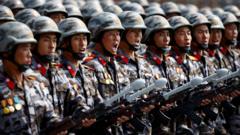North Korea has officially stated that it deployed troops to support Russian forces in Ukraine, following claims of their involvement in the Kursk region and highlighting a deepening alliance between the two nations.
North Korea Acknowledges Troop Deployment to Support Russia in Ukraine Conflict

North Korea Acknowledges Troop Deployment to Support Russia in Ukraine Conflict
In a significant confirmation, North Korea admits it has sent soldiers to back Russia in the ongoing Ukraine war, marking a historic acknowledgment of their military role.
North Korea's recent announcement confirms long-held suspicions by Western intelligence about its military support for Russia in the Ukraine conflict. The country's state news agency KCNA stated that North Korean troops helped liberate the Kursk area, aligning with an order from Kim Jong Un. While Moscow praised the soldiers' heroism, the West emphasized that North Korea now shares in the responsibility for ongoing hostilities.
North Korea has confirmed, via its state news agency KCNA, that it dispatched soldiers to fight alongside Russian forces in Ukraine, particularly in the Kursk region, as part of an agreement with Moscow. This admission, made by Kim Jong Un, marks a pivotal moment as it demonstrates a military alliance that has emerged from deepening ties between the two nations. Reports indicate that around 11,000 troops were sent from North Korea, and Western intelligence has previously suggested that a number of these soldiers may have died in the conflict. The revelation follows statements from Russian officials praising North Korean troops' contributions, with claims of significant military victories, such as regaining control over the Kursk region—assertions that Ukraine contests.
The deployment is said to be in line with a mutual defense treaty between North Korea and Russia, underscoring their "brotherhood" as articulated by Kim. Despite concerns over the readiness and training of these troops, Ukrainian military officials acknowledge the potential threat posed by the additional manpower at the front lines. Historical and tactical parallels are drawn to the soldiers' operational methodologies, reminiscent of Soviet patterns, complicating Ukraine's defensive efforts. The implications of North Korea's involvement in the conflict not only exacerbate tensions in the region but also suggest a persistent commitment by Pyongyang to bolster its military ties with Moscow in the face of international scrutiny.
North Korea has confirmed, via its state news agency KCNA, that it dispatched soldiers to fight alongside Russian forces in Ukraine, particularly in the Kursk region, as part of an agreement with Moscow. This admission, made by Kim Jong Un, marks a pivotal moment as it demonstrates a military alliance that has emerged from deepening ties between the two nations. Reports indicate that around 11,000 troops were sent from North Korea, and Western intelligence has previously suggested that a number of these soldiers may have died in the conflict. The revelation follows statements from Russian officials praising North Korean troops' contributions, with claims of significant military victories, such as regaining control over the Kursk region—assertions that Ukraine contests.
The deployment is said to be in line with a mutual defense treaty between North Korea and Russia, underscoring their "brotherhood" as articulated by Kim. Despite concerns over the readiness and training of these troops, Ukrainian military officials acknowledge the potential threat posed by the additional manpower at the front lines. Historical and tactical parallels are drawn to the soldiers' operational methodologies, reminiscent of Soviet patterns, complicating Ukraine's defensive efforts. The implications of North Korea's involvement in the conflict not only exacerbate tensions in the region but also suggest a persistent commitment by Pyongyang to bolster its military ties with Moscow in the face of international scrutiny.



















